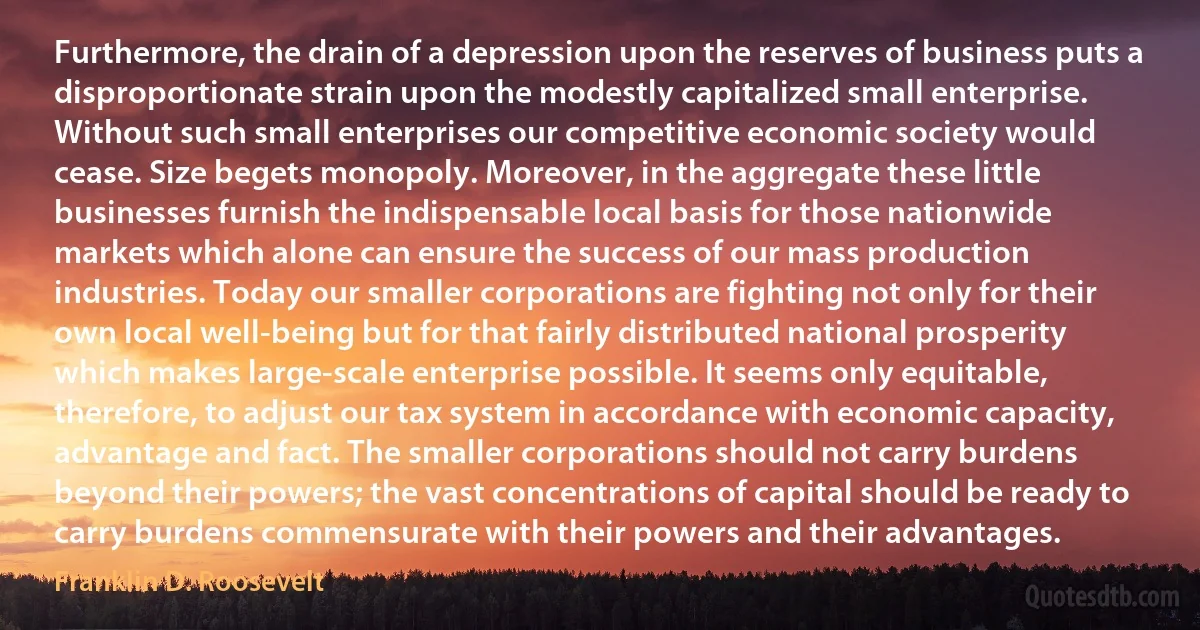
Furthermore, the drain of a depression upon the reserves of business puts a disproportionate strain upon the modestly capitalized small enterprise. Without such small enterprises our competitive economic society would cease. Size begets monopoly. Moreover, in the aggregate these little businesses furnish the indispensable local basis for those nationwide markets which alone can ensure the success of our mass production industries. Today our smaller corporations are fighting not only for their own local well-being but for that fairly distributed national prosperity which makes large-scale enterprise possible. It seems only equitable, therefore, to adjust our tax system in accordance with economic capacity, advantage and fact. The smaller corporations should not carry burdens beyond their powers; the vast concentrations of capital should be ready to carry burdens commensurate with their powers and their advantages.
Franklin D. RooseveltRelated topics
advantage aggregate beyond business carry cease depression drain fighting furnish mass monopoly national possible production prosperity ready should size small success tax vast today reservesRelated quotes
The acquisition of San Domingo is an adherence to the 'Monroe doctrine'; it is a measure of national protection; it is asserting our just claim to a controlling influence over the great commercial traffic soon to flow from west to east by way of the Isthmus of Darien; it is to build up our merchant marine; it is to furnish new markets for the products of our farms, shops, and manufactories; it is to make slavery insupportable in Cuba and Porto Rico at once, and ultimately so in Brazil; it is to settle the unhappy condition of Cuba and end an exterminating conflict; it is to provide honest means of paying our honest debts without overtaxing the people; it is to furnish our citizens with the necessaries of everyday life at cheaper rates than ever before; and it is, in fine, a rapid stride toward that greatness which the intelligence, industry, and enterprise of the citizens of the United States entitle this country to assume among nations.

Ulysses S. Grant
But what would become of mass production and its system of financial expansion if technical perfection, durability, social efficiency, and human satisfaction were the guiding aims. The very conditions for current financial success - constantly expanding production and replacement - works against these ends. To ensure the rapid absorption of its immense productivity, megatechnics resorts to a score of different devices: consumer credit, installment buying, multiple packaging, non-functional designs, meretricious novelties, shoddy materials, defective workmanship, built-in fragility, or forced obsolescence through frequent arbitrary changes of fashion. Without constant enticement and inveiglement by advertising, production would slow down and level off to normal replacement demand. Otherwise many products could reach a plateau of efficient design which would call for only minimal changes from year to year.

Lewis Mumford
They were now as a party engaged in carrying laboriously uphill the last few columns out of the Gladstonian quarry. ... Foremost among the tasks of Liberalism in the near future was the regeneration of rural life and the emancipation of the land of this country from the paralysing grip of an effete and unprofitable system. ... [The reports into rural life] were startling. When they were published they would prove conclusively that there were hundreds of thousands, if not millions, of men, women, and children dependent upon the land in this country and engaged in cultivating it, hardworking men and women, who were living under conditions with regard to wages, to housing, as well as hours of labour-conditions which ought to make this great Empire hang its head in shame that such things could be permitted to happen in any corner of its vast dominions, let alone in this country, the centre and source of all its glory.

David Lloyd George
Production, and production alone, can find us relief in our immediate situation. It is no part of the British character to resign ourselves to such difficulties or to fail to take the measures, however hard, to overcome them. It has been truly said that by our faith we can move mountains. It is by our faith in ourselves, in our country, in the free democratic traditions for which the people of this country have for centuries fought and battled, and for which they must fight again as willingly on the economic front as upon the oceans, on the land and in the air, it is by our faith in the deep spiritual values that we acknowledge in our Christian faith, that we shall be enabled and inspired to move the present mountains of our difficulties, and so emerge into that new and fertile plain of prosperity which we shall travel in happiness only as the result of our own efforts and our own vision.

Stafford Cripps
IN a free‐enterprise, private‐property system, a corporate executive is an employe of the owners of the business. He has direct responsibility to his employers. That responsibility is to conduct the business in accordance with their desires, which generally will be to make as much money as possible while conforming to the basic rules of the society, both those embodied in law and those embodied in ethical custom. Of course, in some cases his employers may have a different objective. A group of persons might establish a corporation for an eleemosynary purpose-for example, a hospital or school. The manager of such a corporation will not have money profit as his objective but the rendering of certain services. In either case, the key point is that, in his capacity as a corporate executive, the manager is the agent of the individuals who own the corporation or establish the eleemosynary institution, and his primary responsibility is to them.

Milton Friedman
